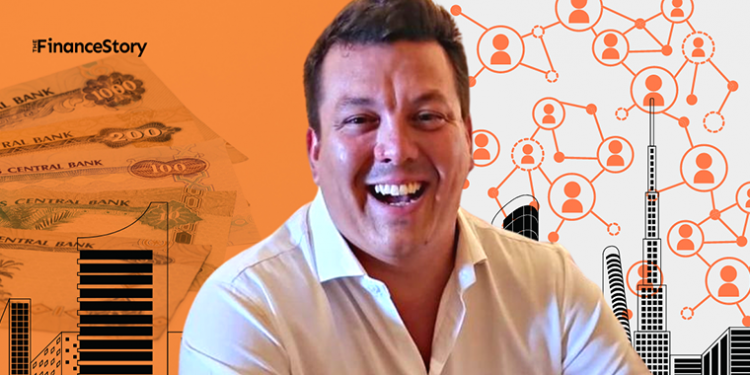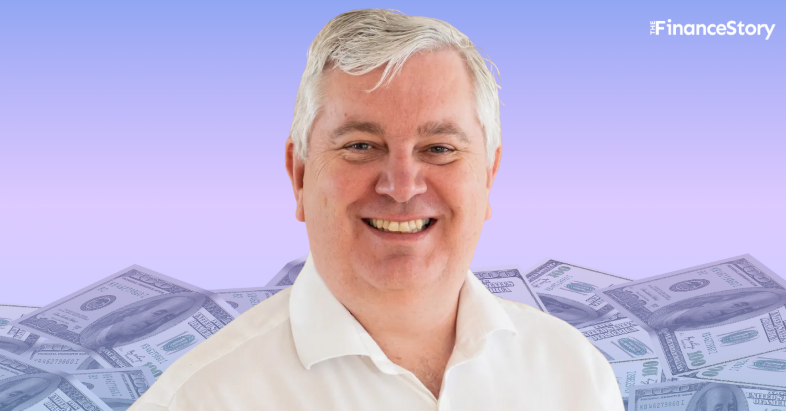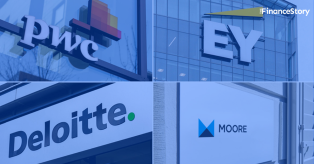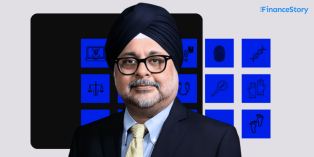The Financial Services and Insurance sector in UAE contributes almost 10% to the country’s GDP.
Oscar Orellana Hyder – Head of Financial Services at Robert Walters Middle East, says that the UAE job market is much smaller compared to London, or New York.
Want to set yourself apart from the crowd? Master Soft skills, Resilience and Networking, says Oscar.
Excerpts from the interview.
You have been in Dubai since 2016, heading the Financial Services recruitment for Robert Walters. Could you talk about the roles you hire for?
Robert Walters has been at Dubai International Financial Centre (DIFC) for ten years.
We have a team of 48 at DIFC covering recruitment in the Gulf Cooperation Council (GCC); including in UAE, Qatar, Kuwait, Bahrain, and Saudi Arabia.
I have a phenomenal team of people around me, including those who specialize in sub-sectors such as asset management and insurance.
Our business is positioned in the DIFC, where every business that operates under a financial services license is fully regulated and governed by UK English common law.
There are high levels of compliance risks and governance in the DIFC, which means that the roles we recruit for are largely driven by the regulator. We are capable of hiring any type of role in the financial services industry.
My team focuses on,
- Hiring accountants, compliance, risk, operations, middle office, lawyers, and technology professionals.
- There are more middle and back-office roles, as compliance finance is considered back-office. Previously, compliance finance only provided support, but it’s now being alluded to businesses.
- We also recruit for direct investments for our sovereign wealth clients in Abu Dhabi or direct investment vehicles here.
- A lot of them start their career in investment banking and move across to the buy side and those types of positions.
The Financial Services and Insurance Sector in the UAE contributes to almost 10% of the UAE’s GDP. Can you give us an overview?
The financial services sector in the UAE is diverse.
It includes banks, insurance companies, foreign exchange providers, and service providers such as compliance and financial service providers.
Islamic banking is also a significant component of the sector, and there are many shariah-compliant activities to be aware of.
To complement those granddaddy sectors of banks and insurance we now have the fintech hive in the DIFC. We have innovation labs and co-working spaces like WeWork and Hub 71.
DIFC serves as a financial hub, where most financial services companies set up, including buy-side private equity funds, and family offices. Abu Dhabi also has plenty of sovereign wealth funds.
The investment landscape in the UAE has also shifted toward direct investments in technology, including hedge funds and buy-side investments. Using oil as a means of wealth generation is gone now.
Overall, there are numerous facets to the financial services sector in the UAE, such as risk, governance, and compliance, making it a dynamic and exciting industry.
In 2022, Fintech was a big deal all over the world. Are there a lot of candidates in UAE looking for opportunities in this field?
I am still bullish on Fintech in 2023.
Traditional banks and fintech complement each other. Banking as a service, lending as a service, buy now pay later, and remittance businesses are examples of how fintech is relevant.
And I have got a lot of clients in fintech.
While fintech companies may be younger and less structured than banks, they are more nimble and agile. This allows them to move quickly and make decisions efficiently.
Fintech companies may not offer the same amount of paycheck as banks, but if you believe in the founders, and their product then you can join.
You could get some long-term incentives such as Employee Stock Ownership Plans – ESOPs, perhaps even through an IPO.
Corporate Tax is going to be effective from June 1st, 2023 in the UAE. Are many companies building a tax team or hiring a Head of Taxation?
The scenario is slightly different in the financial services industry, compared to the commercial industry.
Businesses like FMCG, retail, and real estate require a very specific taxation accountant, known as a Chartered Tax Adviser (CTA).
In contrast, financial services such as funds, hedge funds, and private equity businesses do not require as many corporate tax professionals.
Legal firms may advise commerce and industry businesses to have a tax team of 4-5 people, as opposed to hedge funds. Some hedge funds may not even have CFOs on site and outsource the accounting function.
For example, there is a fund here that has almost 60 people with only one compliance person in the whole business. So they are not going to have teams of corporate tax people overnight.
But it’s going to happen gradually.
Even though the corporate tax law will become effective from June 1st, 2023, companies won’t have to take action until July next year.
Many Finance Controllers, Chartered Accountants, and CFAs are looking for CFO job roles in the UAE. How should they go about it?
The DIFC in Dubai is only 16 years old and Abu Dhabi Global Market (ADGM) is just 7; very young in comparison to say, New York or London.
Thus the process of finding job opportunities in the UAE, especially for senior folks can take longer compared to those cities.
You must treat finding a job as a job and be resilient. If one recruiter does not pick up your call, try another one.
At Robert Walters, we receive an overwhelming number of applications for each job advert we post online, averaging around 5000. So it is only natural for us to mistakenly overlook a few CVs.
So is there a way you can stand out in the competitive job market?
The importance of Networking:
- Networking is an incredibly powerful tool in today’s world. It’s not just about who you know, but also about what you can contribute to a group of like-minded professionals to gain an advantage.
- Attend leadership groups, community events, and professional networking events to make valuable connections.
- If you are a CFO from another country and want to break into a new market, I suggest you join a CFO group or networking round table. You would not just meet the right people but also learn from them.
Personal Interaction:
- The most effective way you can find a job in this field, I would say, is through personal interaction.
- Reach out to us on LinkedIn to make a connection, or better yet, pick up the phone and call us.
- Meeting with a recruiter in person and sharing your story and qualifications is also a good idea. Break the monotony of an hour-long Zoom call and get down to our office or any other recruiter/employer with your CV in hand.
- However, avoid pestering or chasing recruiters otherwise, they would not consider you for a potential job role when it becomes available.
- Following up with recruiters every two to three weeks is enough.
- And last but not least, Be Kind.
Upskill yourself:
- Soft skills are also crucial in differentiating yourself from others in the job market.
- The best people that I have recruited over the years have had phenomenal soft skills and great Emotional Quotient or EQ, as opposed to Intelligence Quotient (IQ).
- To stay ahead of the competition, it’s important to keep yourself updated with current norms and regulations coming into your profession.
- You can also consider taking a course or getting a license in a field of your choice to have an edge over others.
Conclusion…
The UAE is home to around 50 banks and over 150 insurance companies.
DIFC is home to over 2,500 companies, including banks, insurance providers, and asset management firms. The insurance market in the UAE is one of the largest in the Middle East, with a total premium income of $13.7 billion in 2019.
The UAE’s financial technology (fintech) industry has been growing rapidly, with around 200 fintech start-ups operating in the country as of 2021.
So you can imagine what the future holds for expats who are planning on moving to the UAE.
There has been hype over the introduction of corporate tax laws in the UAE. And there will be a demand for Corporate Tax professionals. But the roles are not going to be in demand this soon.
You can prepare for it though. Acquire international taxation knowledge or pursue relevant courses related to UAE taxation laws and regulations to stay ahead of the game when the opportunity arrives.
Looking for career advice? Fill up this form to talk to an industry expert.














